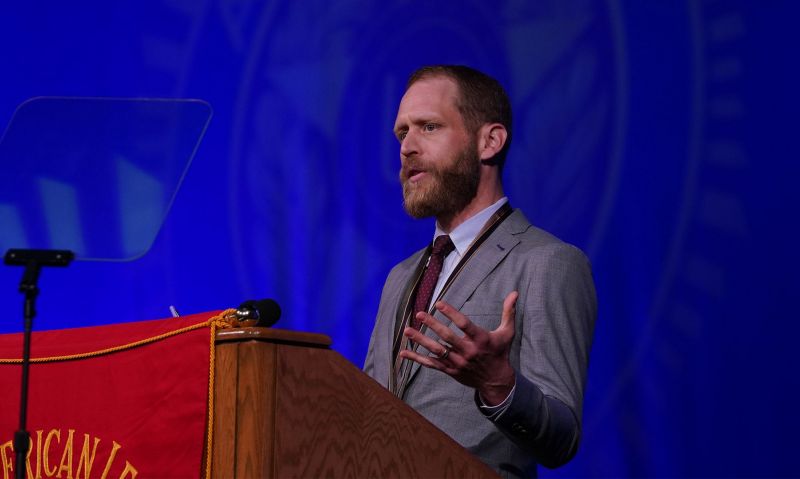
Colorado suicide prevention coordinator urges Legionnaires to reach out to gun owners in crisis with an offer to help.
When Matt Wetenkamp gets a phone call about a friend or colleague who may be in crisis, one thought immediately pops into his head.
“Do they have guns?” said Wetenkamp, who served in Operation Iraqi Freedom as a U.S. Marine scout sniper. “Do they have access to the other guns in the house? Is there somewhere we can keep them for a few days until the dust clears?”
“Lethal means safety” was the topic of Wetenkamp’s address to The American Legion National Convention on Sept. 1. Now the veteran suicide prevention coordinator for the Colorado Department of Public Health and Environment, Wetenkamp said the window of crisis for an individual is small, and that Legionnaires – as veterans and gun owners themselves – can provide a life-saving intervention simply by taking firearms out of the situation.
“It doesn’t have to be grand. You don’t have to say it perfect,” he said. “There’s no perfect way to tell somebody ‘I care about you. I’m worried about you. Can I hold your guns for a couple of days? I’m not going to be able to sleep tonight knowing you’re here alone: empty house, you and all those guns. Can I change the code on your (gun) safe? Or come stay at my place.’
“It doesn’t have to be perfect. Just have the conversation. Reach out.”
Wetenkamp said often when people discuss lethal means safety, those people work in public health or for the government. “They have a lot of initials after their name, or maybe it’s just one initial but it’s the wrong one,” he said. “It complicates everything on this topic of guns. So to those who look at this topic of lethal means safety and guns and suicide and say ‘I know what that is. That’s a Trojan horse heading towards gun control. I want no part of it.’
“Friends, I say this is the opposite of that. This is keeping the efforts of gun control perhaps at arm’s length. It’s saying ‘yes, red-flag laws, confiscation, those are technically options. But we’re going to keep those there. We’ve got this as protectors of our community.’ As gun owners, no one knows better than us the lethality of these tools, and we’ll look out for one another.”
Wetenkamp shared what he said gun owners and veterans already know: guns are effective in carrying out their mission. “We know (suicide) attempts with a firearm are 90 percent fatal or higher. We take all the other attempts together and combine them, they’re fatal around 5 percent,” he said. “Firearms are a lethal tool. I’m always perplexed (that) I’ll do outreach in the community and someone will say to me ‘Why are you focused on guns. Leave us alone. Are you out talking to people about cars and ropes and belts and razor blades?’”
Wetenkamp’s response? “’Well no, I’m not. Do you carry a rope in your holster?’ he said. “Guns are a tool. We, as veterans, know that better than anybody. They’re a very lethal tool designed for a very specific job, and they’re good at it. Firearm ownership indicates an increased risk for suicide.”
Wetenkamp said other gun owners have said to him “’Are you saying we’re crazy? Gun owners are crazy? We’re more likely to die by suicide?’ Well, no. Again, it can happen to anyone. The life crises that are thrown at us, and our friends, family and neighbors every single day, can happen to anyone. The difference is when gun owners get to that lowest point, when they’re in that tiny window of crisis, when it feels like the world is closing in and there are no options, there’s no way out – how is this going to end? When they reach out, they have the 90-percent lethal tool at arm’s length. It’s an impulsive act at our lowest point.”
Knowing all that, Wetenkamp then asked “what can we do then? What is our role as veterans? As gun owners? (In) Every single study of gun owners, the No. 1 reason for owning a gun is called protection. Protection of my community. Protection of myself and others. Protection of my family. We want protection. But if I imagine myself being the sort of people who will draw my weapon in defense of others, what else will I do?”
Wetenkamp suggested that when dealing with friends or family members in crisis, Legionnaires take the role of the bartender who convinces someone who has had too much to drink to not get behind the wheel a vehicle and drive drunk.
“You are the bartender in this situation,” he said. “You’re the leaders in your communities. Post commanders (and) post leaders welcoming in the new veteran who just joined. You’re the ones who know who got served with divorce papers. Who got fired. Whose kids are really sick.
“We need your leadership in the communities. We need you to be the voice of reason as gun owners who can say from the perspective of a gun owner – and a protector of the Second Amendment and gun rights in this country – and say ‘let me help you. You, your problems and your guns are safe with me until things are better.’”
- Convention

